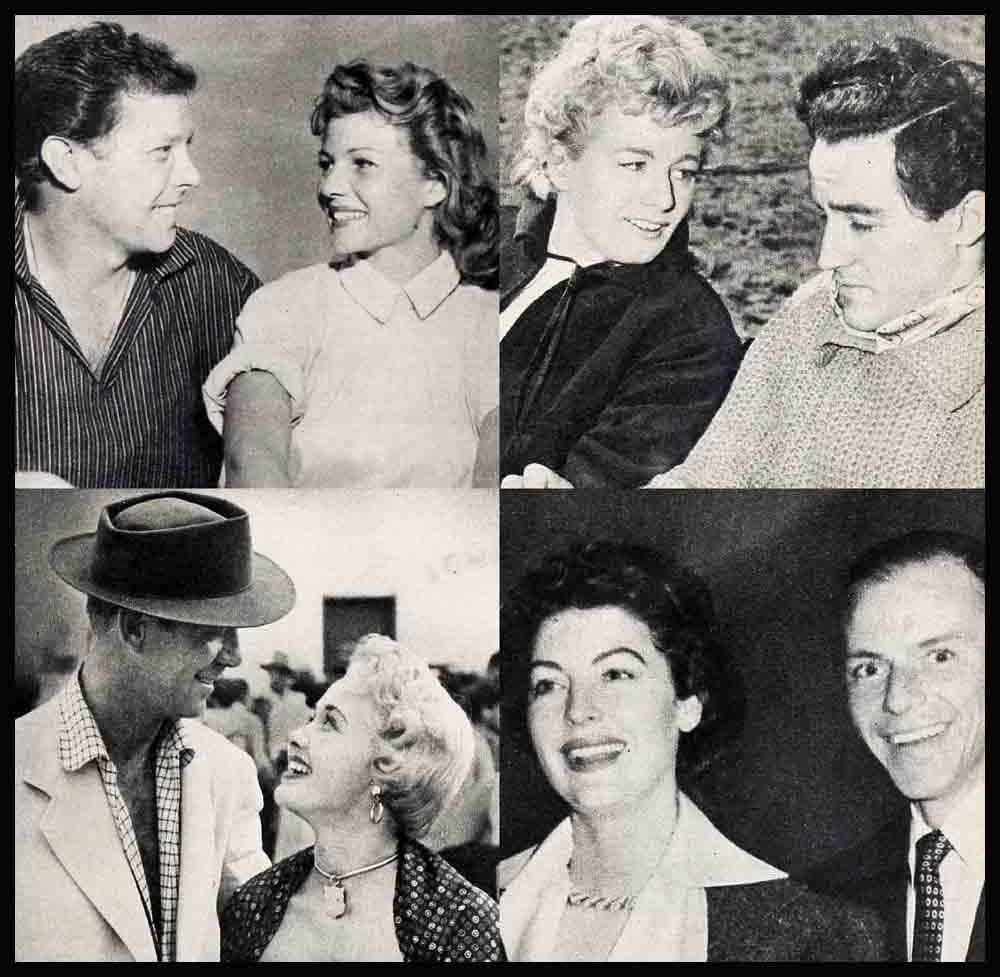
Too Hot To Last?
When a Los Angeles reporter was asked if he were going to cover Lana Turner’s wedding to Bob Topping, he replied, “No. I’ll wait and catch her next marriage.” The reporter, like most of us, knew that impulsive, emotional Lana would more than likely have another marriage fling before too long.
Lana, a child of nature, is not overburdened with inhibitions. I’ve seen her pick out an attractive man at a party, walk up to him and say. “I’m Lana Turner. What’s your name?” She gives so much of her emotional self that most of the men retreat in fright. No male wants to be completely ham-strung. Lord Byron must have had a woman of Lana’s fire in mind when he wrote. “Love to a man is a thing apart. ’Tis a woman’s whole existence.”
But Lana, of the roving eye, can cast men off as easily as she takes them on. Fernando Lamas, a hotblooded Latin with plenty of sexy ego, found that out. He took Lana to the party Marion Davies gave for the Johnnie Rays. All went well until that Turner eye caught a glimpse of Lex Barker. Soon they were dancing cheek to cheek, and the Lamas anger blazed. Enraged, he got Lana home; and ’tis said he left a few bruises on the famous Turner face to remember him by for a few painful days.
After his break-up with Lana, it was ironical—or just human nature—that Fernando should latch onto Lex Barker’s ex-wife, Arlene Dahl. Of course, hot publicity on the couple started. But it is my belief that Fernando will return to his ex-wife, after he’s firmly established in Hollywood.
A split-up between the two wouldn’t break Arlene’s heart. She showed how her heart fluctuates when she quit Lex Barker on the eve of their highly publicized wedding, flying back to Hollywood from New York with canceled marriage plans; then flying back to join him at the altar a few days later. Of course, Lex proved himself just about as stable when he followed Arlene and lured her back to becoming his bride. The marriage lasted just a speck over a year.
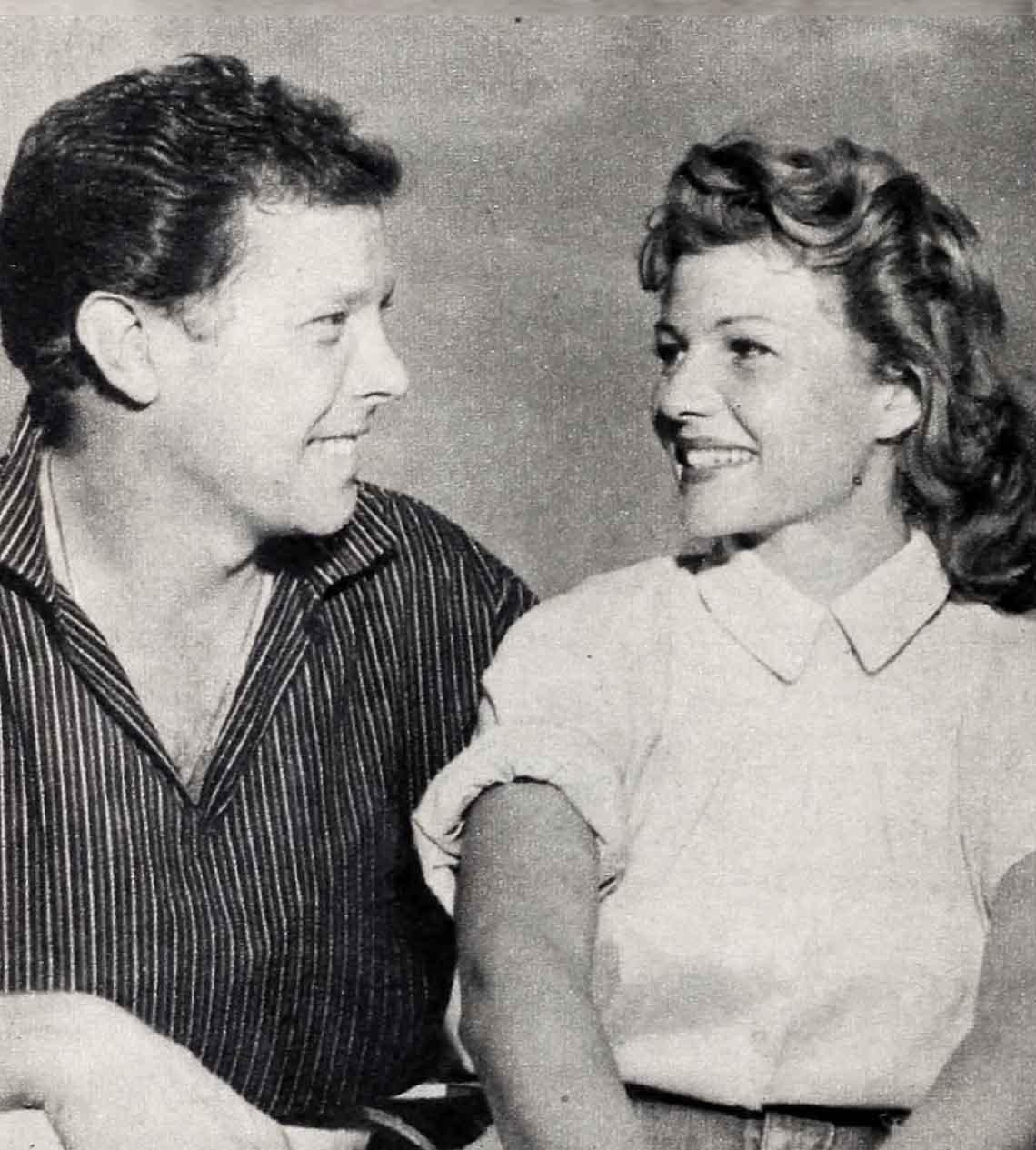
Then Lex, as a bachelor, became like a little boy in a candy shop. Eligible men in Hollywood are few, and beautiful girls are plentiful Lex had a field day until Lana snared him, hook, line, and sinker. That match is still inexplicable to Hollywood. Al the start, the flame between them burned brightly. Then, I’m told by intimates of the pair, Lana became bored. But she was in a spot. After the Lamas affair, it would have been bad publicity for her to jump from one guy to another. And Lex, whose stardom is a mere twinkle beside Lana’s, can be a persistent cuss. If Lana made the first play, it was Lex who pursued her all over Europe. I’ll give that marriage at most two years, and at that I’m overly optimistic.
There are many aspects to this marriage that are, in a way, reminiscent of the Ava Gardner-Frank Sinatra hassle. And whoever expected that to last as long as it has?
But now, after all the spats and reconciliations, it does look as if it’s over for good. You don’t talk to lawyers for fun.
Ava has a talent for marrying temperamental men. First it was Mickey Rooney. Then Artie Shaw. Artie succeeded in confusing her mind with his pseudo-intellectualism and temperament. When that marriage ended, Ava had had it. She knew her feminine strength, and she was tired of being kicked around by men. Then along came Frankie and Ava was ready for him. Her hot blood and hot temper more than equalled his. And that was the trouble!
The tragedy of Ava’s life is that she wants children. She even had an operation to increase her chances of having a baby.
But Rita Hayworth has had children—and look at her hectic love life! In the beginning she worked diligently to get into showbusiness. Once established, however, she got a yen for men and an indifference toward her career. Rita flouted convention by cavorting all over Europe with Aly Khan before he married her. After their wedding, she gave up her career to become a princess. But since Rita was not born to the purple, royalty became tiresome. She didn’t know how to behave. So she returned to Hollywood, resumed her career, then took the maddest fling of all by marrying Dick Haymes.
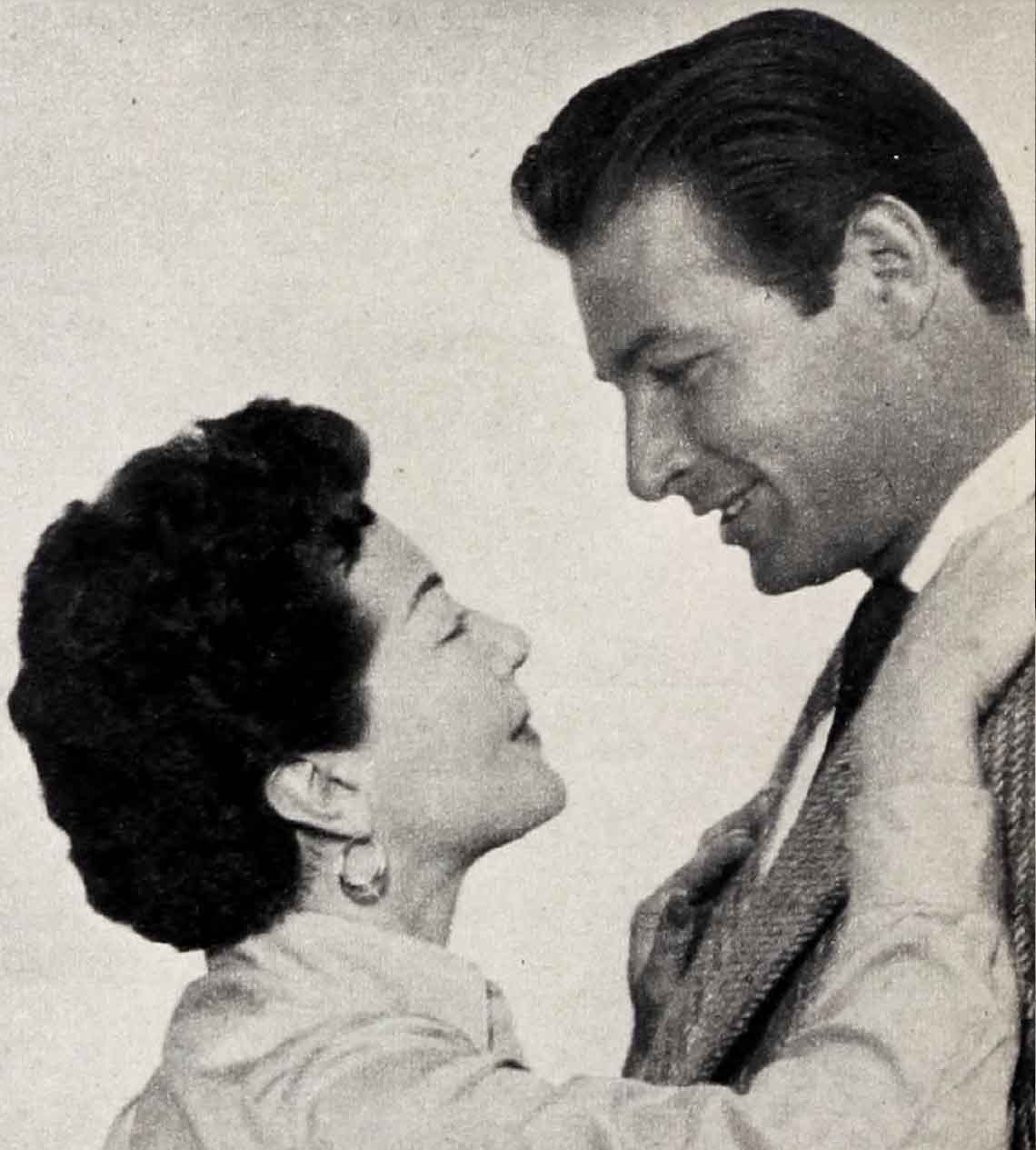
I could never see Dick as a lady-killer, but he must have something–and it isn’t money. Nora Eddington told me her marriage to him was full of surprises. Not the least was the fact that he neglected to tell her she was his third wife. Seems he’d completely forgotten wife Number 1.
Ingrid Bergman started the recent cycle of mad passion among movie people with her completely unorthodox affair with Rossellini. When I interviewed her in the old days, she’d ask me to refrain from bringing in her husband, Dr. Peter Lindstrom, because that kind of publicity was considered unethical in medical circles. Then she spread his name over the world when she deserted him for Rossellini. Whether that flaming love still exists I wouldn’t know. They have three beautiful children; but friends of mine who visited them in Rome told me they seemed bored with each other.
I wish that success had had a sobering effect on Kirk Douglas. But it hasn’t. When I first met him, he was a modest family man worried about a budding film career. The came “Champion.” Overnight Kirk was a movie star. Suddenly he was “somebody,” and he began living the new role to the hilt. He separated from his wife and later divorced her. Taking a small home in the Hollywood hills, he became a veritable bear of a bachelor.
But Kirk’s emotions didn’t linger. No girl lasted with him very long until Irene Wrightsman entered his life. And thereby hangs a tale. Kirk, the son of immigrant parents, missed many of the joys of youth. Irene was raised in the lap of luxury. She became a fascinating subject to the newly-born star; and many thought he would marry her and settle down. But the call of the wild proved too appealing.

Then he met a new kind of girl—Pier Angeli, Though aged beyond her years by living in war-time Italy, she still remained as fresh and beautiful as a morning rose. When I saw them together in “The Story of Three Loves,” I was horrified. It was obvious on the screen that she had fallen in love with one of the biggest wolves in Hollywood. What broke up their romance, I don’t know. I’d like to think it was a latent gallantry on Kirk’s part.
Anyway Kirk went to Italy to do “Ulysses,” and there he really continued so blossom as a celebrity. In Hollywood, his small house was so untidy that even his intimates apologized for it. Clifton Webb tells me this is all changed. He saw Kirk in Rome, and the guy has taken aver a veritable palace. The beauties still soar around him like moths around a flame.
Gene Nelson, by no stretch of the imagnation, is a Kirk Douglas. I had always thought he was as solid as the earth. Even on the screen he doesn’t register as anything resembling a fireball. He was deeply in love with his wife, Miriam. He should have been. After they married, she gave up her career to further his. It was she who helped Gene work out his dance routines, only to step aside and watch another do them with Gene on the screen.
Jane Powell was regarded as an All-American girl, a happy wife and mother. But Metro happened to loan her to Warners for “Three Sailors and a Girl,” in which Gene also appeared. Before they knew what hit them, the solid Citizen and the All-American girl were head over heels in love. Hollywood was aghast.
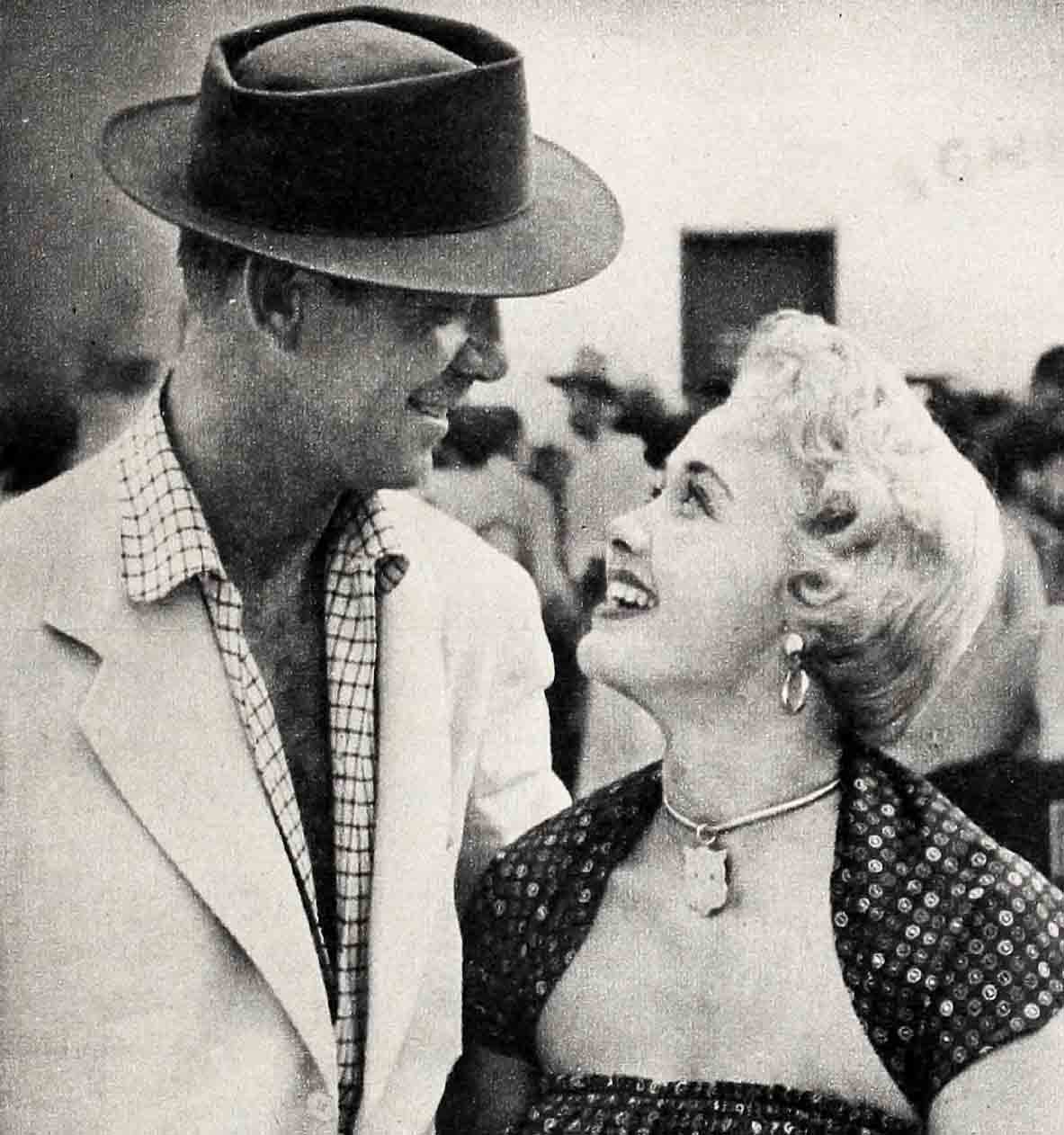
It developed that Jane was not the happy wife and mother. She was the working girl and Geary Steffen, the playboy. With such a situation something had to give. And the perplexed Gene found i himself on the receiving end. I’m not saying he ducked or that Jane made the advances. But there was a strange chemistry between them. Here was a mixed-up young lady who found consolation in her leading man—an old Hollywood story. Perhaps, Gene, bored with many years of marriage, was only too willing for Jane to lean on his shoulder.
Marty Melcher used to have an office next to mine. He, like Geary, was a fun lover who I thought would never settle down. Marty did his share of roving. His romance with Patti Andrews was long; but his marriage to her was brief. Patti adored him. Marty was ready to take his turn at playing the field again when he started going out with Doris Day. There were no emotional fireworks. They courted and married without fanfare. On their way to Burbank to get their marriage license, Doris got hungry and Marty had to take her home to eat first. Compare that with the hullabaloo that went with the Lana Turner – Bob Topping or the Elizabeth Taylor – Nicky Hilton marriages, and you may come up with the answer.
Both Lana and Elizabeth have divorced and re-married. Doris and Marty were never more steady. He has an appreciation for her ability. She has faith in him.
Joel McCrea did the right kind of thinking about marriage in Hollywood when he moved to a ranch far from tinsel town years ago. As a young man, Joel was as naive as he was good looking. I took him to his first major social function, a Marion Davies costume ball. He showed up at my home in a plain linen suit, and I had to disguise him as a South American by pinning a few ribbons around him. Joel didn’t understand that a Marion Davies costume ball meant costume. But scarcely had we arrived, when a top feminine star pulled me to one side and asked, “Who’s that big, handsome lug you’ve got with you?” I told her he was an actor. That very night five stars got together and pooled a bet on which would be the first one to and Joel.
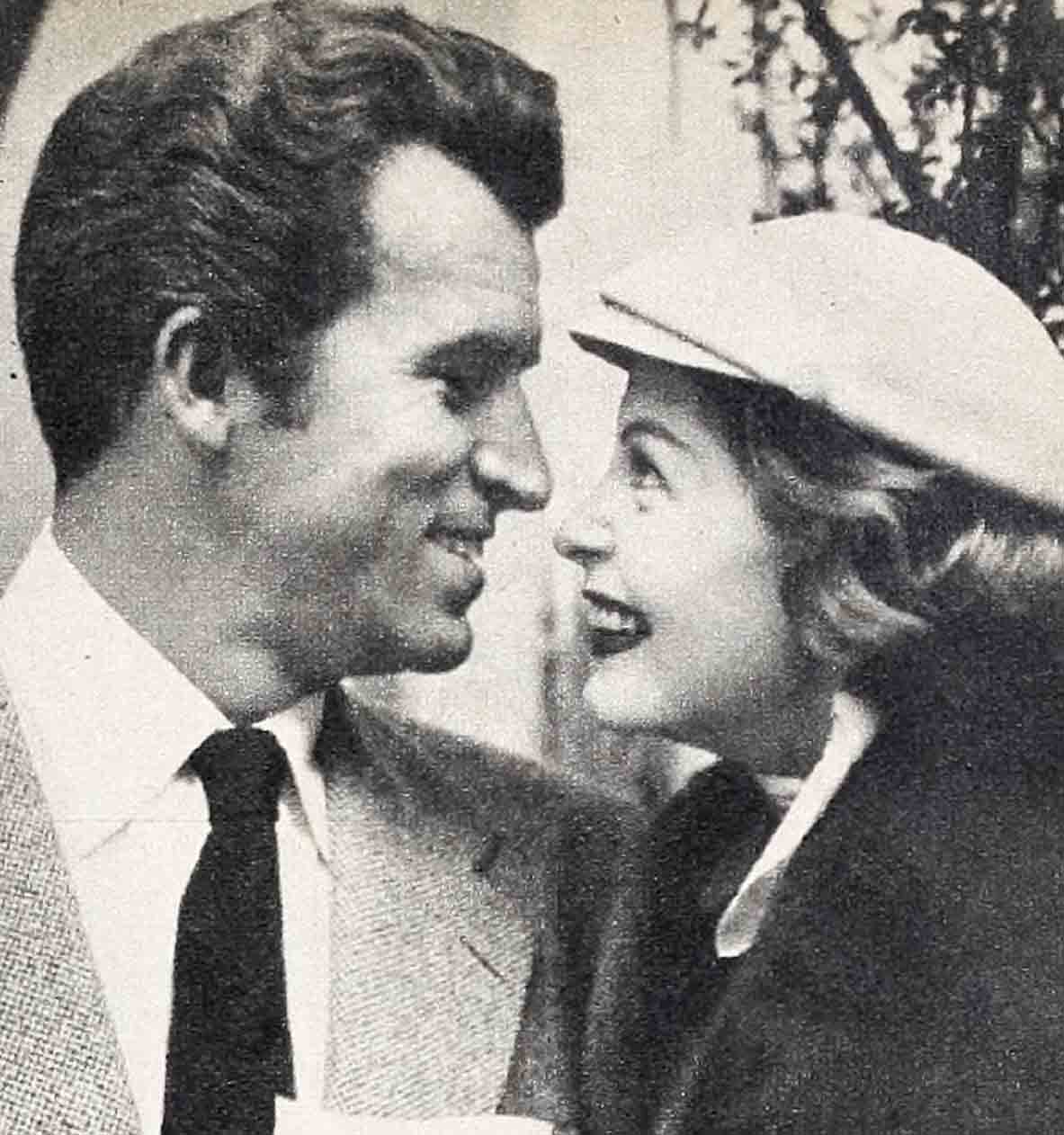
To get close to the guy, all of them asked to have him as the leading man in their next pictures. Producers were going crazy asking, “Who is this guy Joel McCrea?” It so turned out that none of the girls got Joel for romance, but they made him a star. He married Frances Dee, moved away from Hollywood, and seldom comes to town except to make a picture. Frances retired until she’d raised two stalwart sons. Now she’s doing films again.
The conflict between two careers in the same family is often the base of domestic difficulty. And that’s what’s wrong with Shelley Winters and Vittorio Gassman. Both have a tendency to act on frenzied impulse. Their frantic international courtship and marriage made numerous headlines. But the necessary sobriety of marriage is a different matter. Vittorio has commitments in Italy, while Shelley has to remain in Hollywood. And Shelley’s the kind of girl who wants her man around. They’ve had some dreadfu) arguments; but if anybody can tame the tempestuous blonde, it’s Vittorio.
He has the stubbornness of a bulldog—remember he’s a Latin and used to wearing the pants around the house. Shelley can yell and scream until doomsday and Vittorio remains impervious. !We are opposite in nature,” Vittorio told me shortly after his marriage. “My ideas may be wrong, but it’s too late to change them. I don’t like the complete independence of American women. It’s an ancient rule that says a man should dominate.” Well, dominating Shelley is about as easy as controlling a fire engine going downhill. How Shelley will react is unpredictable.
Besides the necessary “absences,” film stars are faced with the fact that for weeks at a time they work with attractive members of the opposite sex, often doing flaming love scenes day after day. Well, that puts a strain on human nature, to say the least! I know of one star who admits she tries to get her leading man to fail in love with her so that he’ll give a better performance. Patricia Neal, a forthright, honest girl, did a picture with Gary Cooper and fell for that old “boyish shyness.” I could have told Pat that Coop was neither boyish nor shy.
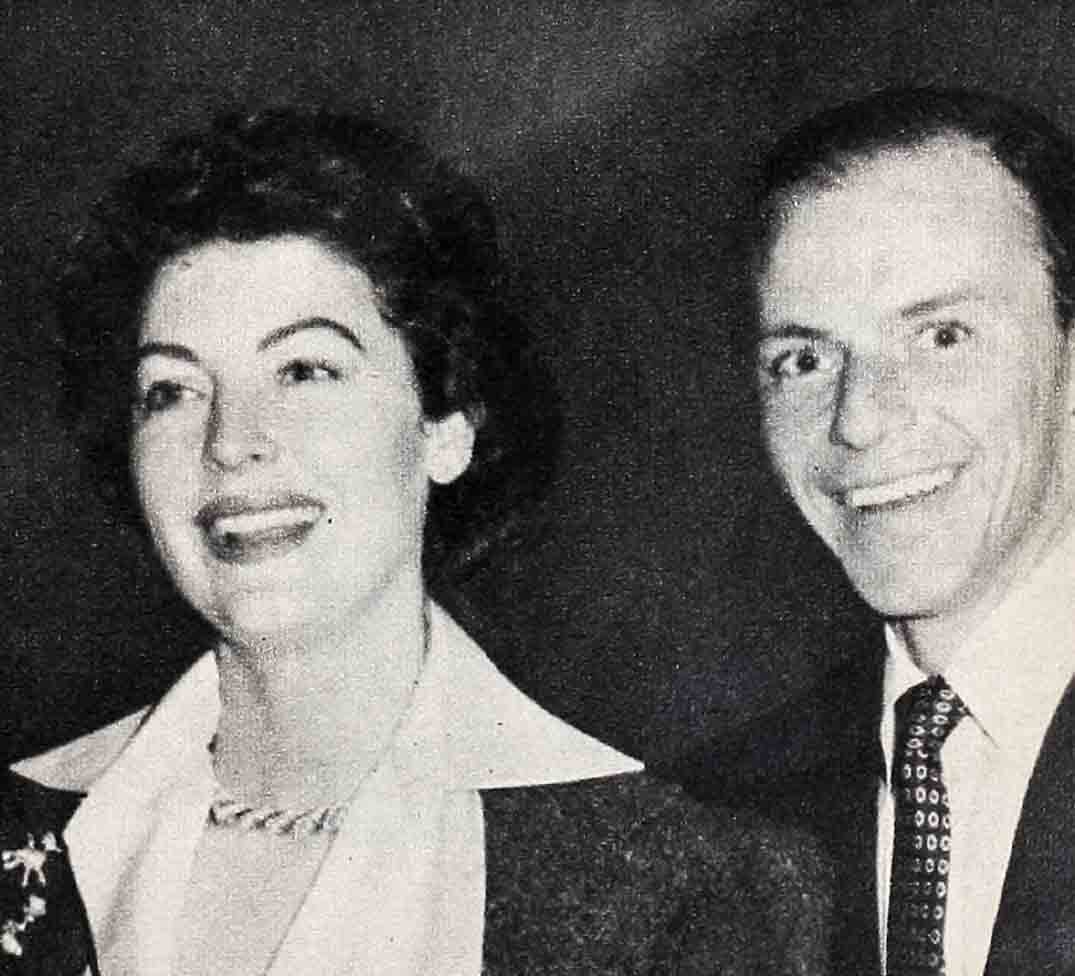
Pat, realizing the odds against her, broke her relationship with Gary, pulled up her Hollywood stakes, and moved to New York, where she found a man who adored and married her. Meanwhile, Coop, with his newfound freedom, continues to puzzle Hollywood, but not me, by roaming Europe with various women, and still managing to keep the home fires burning after his fashion.
I remember visiting Jimmy Stewart in his bachelor days and being appalled at the barrenness of his home, “There’s not a feminine touch about the whole place,” I said. “Why don’t you get married?
“Well,” he replied in complete innocence, “I’ve been thinking about it. But it’s this way. I’ll soon be forty, I’ve waited this long; and, Hedda, at this stage of the game, I don’t aim to be rushed ” His engagement to Gloria came in a typically undramatic way. She was visiting him on his birthday, when the telephone rang. Jimmy answered, hung up, and said, “Will you marry me?” Gloria was so startled that all she could say was, “What!” Jimmy repeated the question, and Gloria said, “Oh, yes.”
Jimmy, though many women found him charming, is no dashing lover on a white horse. But he’s revealed the qualities of an excellent husband. When he finally said, “I do,” it was for keeps.
Now that’s the kind of guy I’d go for, but there are no such animals left in this neck of the woods.
THE END
It is a quote. PHOTOPLAY MAGAZINE JANUARY 1954




